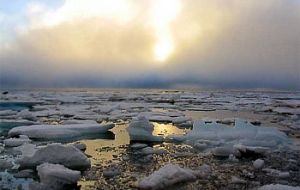MercoPress. South Atlantic News Agency
Pacific species to invade colder Arctic: study
 The melting of marine ice will elevate Arctic water temperatures and create ideal conditions for some molluscs.
The melting of marine ice will elevate Arctic water temperatures and create ideal conditions for some molluscs. Marine animals known to inhabit the Pacific Ocean may flock to the waters of the Arctic as global warming increases water temperatures, a new study claims.
Among the species that may move north are those of shellfish and snails, and at least 77 molluscan lineages - about a third of shallow-water shellfish species in the Bering Sea - may spread to the Atlantic. The massive migration would not be a first for the species - their ancestors kept migrating until cooling conditions that set in three million years ago changed their migration patterns for the long run, states the study published in the journal Science. Scientists from the University of California, Davis, and the California Academy of Sciences believe the predicted warmer Arctic Ocean by 2050 will bring back conditions that last existed some three to 3.5 million years ago. Not only do several north Pacific species have relatives in the north Atlantic, but the fossil record Pacific species invaded Atlantic waters at that time. When cold conditions finally set in, the migrating species - through a lack of food - were unable to follow their usual Arctic route. As productivity in the Arctic rises once more due to ice melts, the northward journey of the molluscs will resume where it was cut off three million years ago. Native species are not expected to necessarily decline as a result of the new species invasion, scientists believe. The fossil record rarely supports the idea of invasions wiping out native species in marine environments, said researcher Geerat Vermeij. Rather, the invasion will add new species and hybrids and boost competition in the North Atlantic. The study's co-author Peter Roopnarine wrote: "The composition and dynamics of north Atlantic communities will change. But whether that will help or harm local fisheries is an open question. Humans may have to adapt as well." (FIS)




Top Comments
Disclaimer & comment rulesCommenting for this story is now closed.
If you have a Facebook account, become a fan and comment on our Facebook Page!